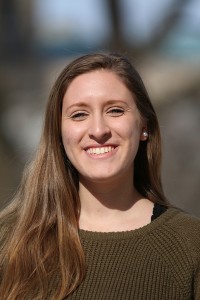One block past the clean, manicured grounds of Lehigh’s campus, the scenery changes completely. The sidewalks and grasses surrounding off-campus houses and businesses are littered with crushed Natural Light beer cans, paper and plastic blowing down the street with no one taking a second look.

Danielle Bettermann (Chris Barry/B&W Staff)
This is what students who live off campus, year-round residents of the South Side and business owners have to constantly see out their windows and when walking around their neighborhood.
No one enjoys seeing trash piling up and not getting cleaned, so why is it a continuous problem that South Bethlehem residents have to deal with?
The answer is simple, and as students, we know every once in a while we are the ones personally guilty of dropping a cup or can onto the grass. We always figure someone else will be there to pick up after us — until the wind carries the garbage into another yard.
While walking down East Fifth and surrounding streets on a sunny spring afternoon, a student can find an array of barbecues.
With a barbecue comes a promise of alcohol and sometimes food, which in turn puts beer cans or plastic cups in the hands of intoxicated college students.
Lehigh students hardly ever remember to recycle when sober, so these trash items are even more likely to end up on the ground when alcohol is also in the mix.
The trash is aesthetically unappealing and disrespectful to any neighbors who work to keep their land clean. However, it also causes several problems for the environment — some that people either aren’t aware of or simply don’t care about.
When these recyclable items are thrown away in the garbage and not properly recycled, they end up in landfills and cannot be used to make new products, as they are meant to be.
Even worse, however, is when the items are not disposed of at all and just left on the streets. They pollute the water and land as well as create hazards for animals that mistake the trash for food. You may have seen the pictures of birds killed by the overwhelming amounts of plastic in their stomach and the infamous video of the sea turtle with a straw jammed inside its nose, all of which illustrate the dangers of littering.
Additionally, trash items such as these take years to decompose completely. According to the U.S. National Park Service, it takes 450 years for a plastic container to decompose and anywhere between 80 and 200 years for aluminum cans to completely decompose. As they decompose, they emit the chemicals that add more pollutants to the air, harm humans’ bodies and even entire ecosystems.
However, these consequences are not things most students think about, and the environment is not usually a topic that is stressed at Lehigh. Students don’t understand our single-stream recycling system and what can go in versus what can’t.
Sure, there are Eco-Reps and other resources available if a student seeks them out, but for the most part students are uneducated about the recycling systems on campus and how to recycle correctly as a Bethlehem resident when they live off campus.
However, sometimes the problem does not only lie in choosing between a trash can and a recycling bin. The main problem lies in the trash I see lining the street every time I walk or drive through South Bethlehem.
Why does one feel inclined to throw trash onto the ground rather than walking a few steps toward a bin? Why is it that, after every barbecue or outdoor event, the grass is littered with garbage that is then blown into other yards and onto the street?
There are easy fixes to these problems, and it begins with students being aware of what they might be doing to the environment every time they drop whatever garbage they are holding. Making students aware and getting them to break away from their every day habits, however, is the difficult part.
If your main focus isn’t on helping to improve the environment by picking up and disposing of your trash, then do it just for the respect of your neighbors and the appeal of how your area looks when it’s free of garbage.
—
Danielle Bettermann, ’18, is an associate news editor for The Brown and White. She can be reached at [email protected].





Comment policy
Comments posted to The Brown and White website are reviewed by a moderator before being approved. Incendiary speech or harassing language, including comments targeted at individuals, may be deemed unacceptable and not published. Spam and other soliciting will also be declined.
The Brown and White also reserves the right to not publish entirely anonymous comments.